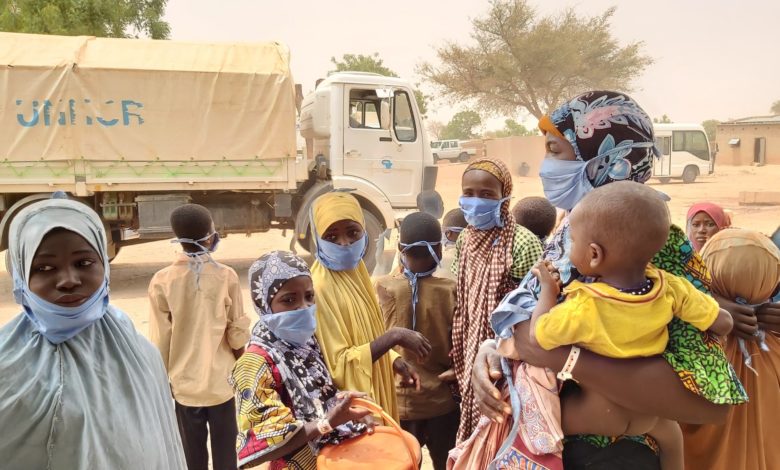COVID-19: Scarce PPEs Put Refugees At Risk Of The Pandemic

At the Garin Kaka refugee camp, in Niger Republic just across its border with Nigeria, HumAngle reporter was face-to-face with over 2,000 fleeing indigenes of Sokoto state. It was a distressing spectacle. Multitudes of women with loads on their heads, some with babies tied behind their backs with wrappers, and one hand still holding tightly to another child.
Several children, weary from hunger and the journey, impatient, and seemingly at edge. Some men, gout, looking frustrated and helpless at the realization that they were surrendering their basic responsibility towards their family and handing their fate into the hands of total strangers in a foreign land.
The refugees were being made to queue and get their biometric data captured by the authorities. The escalating insecurity, the routine raids by brutal armed men in their communities across the border in Sokoto and Katsina states in Nigeria, just across the border forced them to flee. Here they are faced with new living experience and challenges.
Not many in the crowd milling around in the refugee receiving camp are wearing any face masks. Several of those not in the queue were sitting under some canopy but still a majority of them wore no face masks. The was puzzled and approached an agency staff who spoke on condition of anonymity.
“Those with the face masks were already captured and mobilized,” HumAngle was informed. “They are waiting for us to give them provisions, namely food, tents and some utensils while those you are seeing from far distance are not mobilized. Eventually, we will give them the face masks following their biometric data capture.”
Going further into the dwelling areas of the refugee camp, HumAngle observes that several among the registered and mobilised refugees were wearing no face masks. There were equally no hand washing elements in place within the camp.
Musa Hassan, one of the refugees in the camp, told HumAngle that “the officials have frequently enlightened us on the dangers of the disease and the necessary precautionary measures to take but our people don’t believe the disease is of any greater danger than the trauma we find ourselves in.”
He said the authorities have done their bit. He pointed the reporter towards a corner, “look at the place where they stationed liquid soap and a washing bowl but someone made away with it.”
Another refugee, Rabi Gatawa, agreed with Hassan, informing the reporter that “they distributed face masks, washing soap and warned us several times to be washing our hands and to also observe social distancing with everyone in the camp.”
Gatawa further explained that it was probably “due to overpopulation in the camp that makes it impracticable for people to observe social distancing. Especially in this raining period, you can find more than 10 people in one tent.”
However, the authorities of the United Nations Head of Commission for Refugees have said it has launched its global coronavirus emergency plan with an appeal for US$745 million to urgently support its response to situations of forced displacement over the next nine months. Niger Republic, according to the Commission, is one of the top priority countries where an estimated US$5.9 million is required for COVID-19 response initiatives.
The Commission staff who does not want to be named in this report, in Gidan Ruomji, told HumAngle that “the agency has been implementing special prevention measures that include strengthening communication with refugees on hygiene and sanitation, (as well as) increasing the distribution of hygiene supplies and training health workers in the camps.”
The official further said, “though, there are no reports of COVID-19 infections among refugees in Niger Republic, however, there is no reason to believe that this wouldn’t change.” He explained that “the agency offers guidance and fact-based information on prevention measures through printing and distributing leaflets from the World Health Organization, (WHO), and using educational videos. The UNHCR has engaged in mass communication campaigns through the use of public criers, theatre and communication caravans.”
Support Our Journalism
There are millions of ordinary people affected by conflict in Africa whose stories are missing in the mainstream media. HumAngle is determined to tell those challenging and under-reported stories, hoping that the people impacted by these conflicts will find the safety and security they deserve.
To ensure that we continue to provide public service coverage, we have a small favour to ask you. We want you to be part of our journalistic endeavour by contributing a token to us.
Your donation will further promote a robust, free, and independent media.
Donate HereStay Closer To The Stories That Matter




